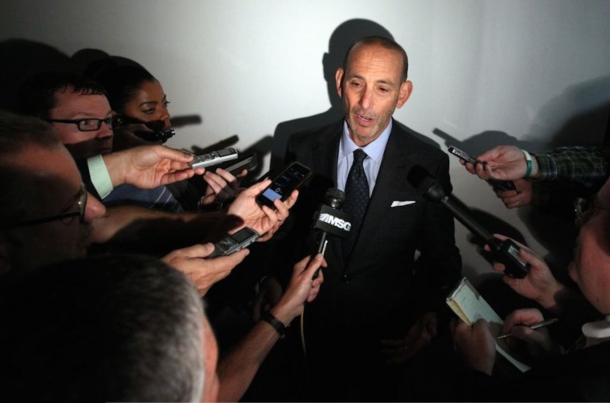The LA Galaxy and Chicago Fire are set to meet up Friday, March 6th to kick off the 2015 MLS season. Orlando City is supposed to #FillTheBowl with over 60,000 spectators at the Citrus Bowl two days later for their first ever match in MLS. David Villa, Kaka, Sebastian Giovinco, Jozy Altidore, Mix Diskerud, and others should be making the MLS debut or re-debuts that weekend as well. England legends Steven Gerrard and Frank Lampard will join in the summer, both with plenty left in the tank. Interest in MLS has never been higher. So, what if all of this never happens?
What if the Galaxy don't play the Fire, Orlando does not get the chance to #FillTheBowl, and what if the new star signings don't get to play? Well, this is the possibility that MLS faces within the next two weeks. MLS and the MLS Players Union have yet to agree on a new Collective Bargaining Agreement. Major problems have yet to been solved in the labor dispute, yet alone negotiated.
The players have said all along one thing and one thing only; either give us free agency, or we will strike. Why are the players willing to sit out and not get paid just because of free agency? Free agency is a problem within another problem. Free agency comes down to the whole MLS single-entity structure that saved the league from death 15 years ago. Guess what though, this isn't the MLS of 15 years ago. Call it MLS 2.0, 3.5, or 4.0, but this MLS is much different from even 10 years ago.
10 years ago MLS had only 12 teams, as well as one that does not even exist today. Most teams struggled to fill their stadiums, and the product on the field was as good as the second or even third division of Brazilian soccer. Some say that the Seattle Sounders "saved the league." This writer refuses to agree to the notion that one club changed the whole course of a league, but it can be argued that the Sounders played a big role.
Many will be quick and point out the David Beckham's arrival to the Galaxy in 2007 was the turning point in the League's history. Those people are definitely correct, but clubs like Seattle and Portland that came during or after sustained the league.
So, today Major League Soccer has risen to 20 clubs who each have a healthy ownership, (mostly) great attendance, and records in ticket sales. MLS just agreed to a wealthy TV contract with Fox and players have started to come from the big leagues in Europe. MLS will add four more clubs by the end of the decade; Atlanta, a second club in Los Angeles (LAFC), and two more, like a combination of Miami/Minnesota/Sacramento. This is just amazing momentum for such a young league (only 20 years old).
The expansion, TV money, and attendance is all at stake in the CBA negotiations. While the players do have the right (and should) fight for free agency, a strike could hurt the league just as painful as the 2004 NHL lockout. A lengthy strike from the players could drive all the buildup the league has done over the last few years’ right into the ground. So while the players should fight for free agency, let’s play the matches and not strike.
Another interesting thing about these CBA negotiations will be to see how it affects the future of the league. If the players do end up succeeding and receiving (some form) of free agency, we could see the start of the end of the single-entity system. What does that mean? More unbalance between rich and small clubs, more clubs entering the league, and eventually (to the much joy of Ted Westervelt) promotion and regulation. So while free agency seems to be a problem of normal size, this key issue could hold the future of Major League Soccer's structure.









































